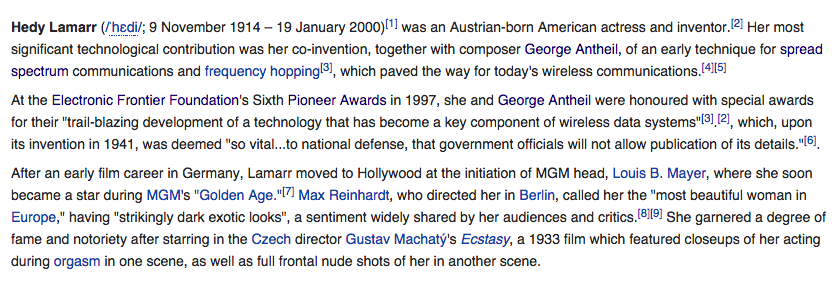Hedy Lamarr, co-inventor of an early technique for frequency hopping, which was the predecessor for wireless communications, was born 100 years ago today.
I came across Lamarr early this year, after having a very thorough introduction to ‘how the internet came to be’ from some friends of mine. Then, I discovered that Hedy Lamarr’s Wikipedia article introduction barely mentioned her incredibly significant scientific inventions – instead, two paragraphs were dedicated to her “great beauty” and her acting. Needless to say, I didn’t appreciate this; so I changed it. As things turned out though, I ended up making things a lot worse.
You can see what the article looked like, as of January 2014, here. (before I had made any edits myself).

Being a strong feminist advocate, as well as an admirer of intelligence and innovation in basically anyone, this annoyed me. I couldn’t imagine that this kind of introduction would be the same for a man whose inventions had paved the way for wireless communication today… so, thanks to the beauty of Wikipedia, I changed it.
I also wanted to highlight that her work has, in recent years, been retrospectively recognised for its importance. The fact that while she was alive she experienced a distinct lack of acknowledgement and credit was not a measure of the importance of her achievement, but rather a sign of the strongly patriarchal society in which she was living. So, I added a sentence about the award she and her co-inventor received by the EFF. I also chose not to delete the original sentences that had been there, but rather put them down to the third paragraph instead of the first, thinking that it was more important for people coming to the page to first learn about her invention, then about her acting career.
I was satisfied- it now looked like this:

…But then, in August, I came across her page again, looking like this:

My re-prioritisation of her achievements had been removed, and actually, the entire first paragraph talked only about her physical appearance, and her acting appearances with reference to her nudity. Her invention is an after thought that she was “also notable for”.
My efforts had, in fact, made it worse. To add insult to injury, before her invention is even mentioned, comes a comment made by a man, about her appearance.
Once more, for effect:
Before the fact that she co-invented the thing that allows us to have wireless communications today, comes a comment that some director made about her being “beautiful”, and, even worse, “exotic”.
Please, anybody - show me a page for a male inventor that has a comment ABOUT HIM by a woman, before any mention of his achievements. What, nobody?
So of course, I changed it. There’s no way that the first thing that someone should learn about Hedy Lamarr is that a man thought she was beautiful; I can’t imagine anything more insulting that prioritising a man’s opinion about her, than her actual achievement.
I changed it to this, and noted that I was:
Prioritising her inventions to top paragraph, over comments on her physical appearance
It looked now, like this:

Ideally, I would have deleted the sentence starting “Max Reinhardt”… entirely - but I’m fairly new to Wikipedia, so thought I’d leave it for now.
Just one hour later, the change was reverted, with the comment:
Undoing good faith change. Invention is significant, but it's not more significant or more noted by sources than her entire acting career. Her acting was serious work she was proud of.
Right. So, because more people writing at the time (men) noted how beautiful she was, and other people (men) talked about her looks more than they did about her invention, her invention gets relegated to the third paragraph? I’m guessing here, but given the huge gender imbalance between Wikipedia editors, that decision was likely also taken by a man.
If Hedy Lamarr had been a man, and an actor, we would not be having this problem. Her/his inventions would have been recognised, as men’s inventions and contributions to science tend to be, and he would have a place in history, and an accurate place in Wikipedia, too.
The fact that her acting career was “more noted” than her invention is not a sign that it was more important, just that she was living in a society where women were valued for their looks, and not treated as equals. (even more so than now.)
If the patriarchal structures that shape the way that history was written in the past continue into Wikipedia today, we’re losing what is, for me, the very point of Wikipedia, as a place where those injustices can be written in a fair and just way. Her Wikipedia article is the main port of call for anyone who wants to know who she was. Right now, they find out what men wrote and said about her beauty, rather than her intellectual achievements.
To celebrate, and honour, her 100th birthday: why not try editing it yourself?